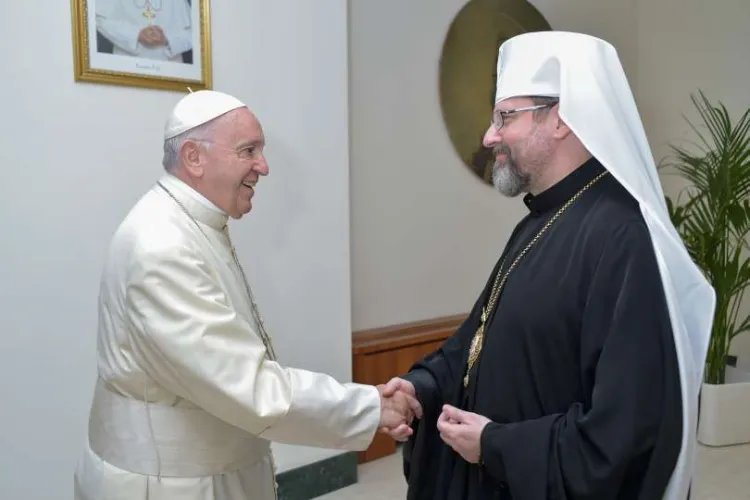Major Archbishop Sviatoslav Shevchuk with Pope Francis in 2020./ Secretariat of Major Archbishop Shevchuk.
Pope Francis prayed yesterday for reconciliation amid rising tensions between Ukraine and Russia.
“I follow with great concern the events in some areas of eastern Ukraine, where violations of the ceasefire have multiplied in recent months, and I observe with great concern the increase in military activities,” Pope Francis said after the Regina Coeli prayer April 18.
“I strongly hope an increase in tensions will be avoided, and, on the contrary, that gestures be made that are capable of promoting mutual trust and fostering reconciliation and peace, which are so much needed and so much desired.”
The pope expressed closeness to those suffering from “the serious humanitarian situation” in Ukraine for which he invited people to pray.
Tensions between Ukraine and Russia have been on the rise due to the build-up of Russian troops along the Ukrainian border and recent clashes in the Donbass region.
NATO Secretary General Jens Stoltenberg has said it is “the largest massing of Russian troops since the illegal annexation of Crimea in 2014.”
On April 16, Ukrainian President Volodymyr Zelenskiy called for four-way peace talks with Russian President Vladimir Putin, French President Emmanuel Macron and German Chancellor Angela Merkel to ease tensions.
Since 2014, an estimated 14,000 people have died in the Donbass region conflict, according to the Ukrainian government.
Major Archbishop Sviatoslav Shevchuk, the head of the Ukrainian Greek-Catholic Church, said in an interview with ACI Prensa, CNA’s Spanish-language sister news agency, that the local Catholic community is very worried about the increase in the Russian military presence and is praying for peace.
“The war in the east of our country that began in 2014 has never stopped,” Shevchuk said. “Now, again, we see long columns of Russian military vehicles heading toward the Ukrainian borders.”
“We are very perplexed and concerned about the increase in the Russian military presence at the gates of our country. It seems that this is the largest militarization to occur since the beginning of the war. This fact cannot go unnoticed by the international community.”
The archbishop of Kyiv underlined the urgent humanitarian need of the population living within the conflict zone, explaining that “the pandemic has deeply aggravated the situation.”
“Unfortunately, access to this area has been severely hampered, people are living without medicine and without adequate medical care,” he said.
“The Ukrainian people are tired of the war caused by Russia. We want peace and we cannot remain silent in the face of the suffering of the people and the tears of the Ukrainian mothers for the death of their children. We live in continuous psychological terror. According to the latest polls, 60% of the Ukrainian population lives in fear of a military attack by the Russian side,” Shevchuk said.
Ukraine and Russia have been in a fragile ceasefire since the 2015 Minsk II Accords. The conflict began after the November 2013 demonstrations, known as “Euromaidan”, against then-Ukrainian President Víktor Yanukovych for his pro-Russian policies .
The protests led to the departure of Yanukovych and the rejection of the pro-Russian population in eastern Ukraine. The intervention of Russian troops resulted in the 2014 annexation of the Crimean peninsula by Russia and the proclamation of independence of the cities of Donetsk and Luhansk in the Donbass region.
Archbishop Shevchuk said that Catholics in Ukraine have been “praying incessantly for peace” since the conflict began and appeal for the international community to be more involved in its resolution.
“In this period of national fear, our Church wants to be close to her people, sharing pain and concern with her own people. The Ukrainian Greek-Catholic Church has always been the Church of the people, in different periods of history we have burdened ourselves with the pain of the Ukrainian people. Today the Lord asks us to do the same,” the major archbishop said.
Source: CNA

